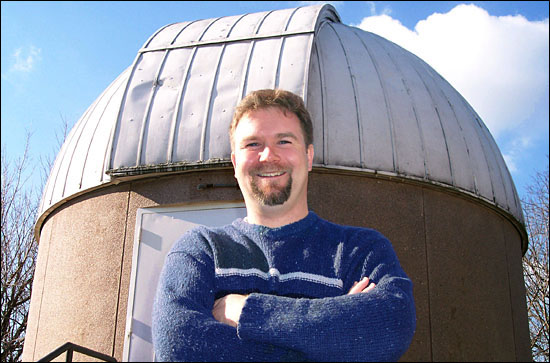Managing the Cosmos: Astronomy Department’s Systems and Facilities Manager Helps Students Observe and Research the Night Sky
 |
| Eric Williams, systems and facilities manager of the Astronomy Department and Van Vleck Observatory, stands outside the observatory’s 24-inch Perkin research reflector, where he often hosts weekly open houses and star gazings. |
| “What’s beautiful about astronomy is that there are always unanswered questions, and when you answer one, that will open up five more questions,” said Eric Williams, the systems and facility manager for the Astronomy Department and Van Vleck Observatory. “I’m always curious.”
An interest in astronomy, physics and computers led Williams to Wesleyan in 1996. “I’ve always wanted a job like this,” Williams said, “I get to experiment with all kinds of things.” Before coming to Wesleyan, Williams spent five years hunting for planets outside our solar system as a sky observer with the planet research team at San Francisco State University. The team has contributed to the discovery of more than 100 extrasolar planets. Williams says he isn’t a telescope equipment expert but he can answer just about any questions regarding how the Wesleyan scopes operate. However, most his time is currently devoted to, as he refers to it, “babysitting computers.” At Wesleyan, Williams, spends about a quarter of his time on research and leading weekly star gazings for the public and an amateur astronomy group. He uses the observatory’s 24-inch Perkin research reflector, the 20-inch Alvan Clark great refractor and the 16-inch Meade Schmidt-Cassegrain reflector, all housed in their own domes on campus. Formerly a sky observer for the SFSU planet search team, Williams says he isn’t a telescope equipment expert, but he can answer just about any questions regarding how the Wesleyan scopes operate. As the systems manager, Williams oversees the department’s server – appropriately named ‘Astro,’ – as well as an array of 10 printers and 40 computers with MacIntosh and UNIX workstations. He assists students with software questions and checks for security alerts daily. “I’m a troubleshooter and an anticipator,” he said. “If a problem comes up, I’ll find a solution. I don’t want people to get behind because of computer problems.” Williams works from his basement office, which also functions as a storeroom. There, heaps of books, papers, computer monitors, keyboards, network cards and tangled wires dwell in any available space, including the floor. Williams, who has a bachelor’s and master’s degree in physics from San Francisco State University, acquired most of his programming knowledge on the job. He self-taught himself programming languages Java, Perl and PHP, and research software including Interactive Data Language, or IDL. Nevertheless, Williams knew he’d never master the programming languages without further education. “I had an intellectual curiosity. I wanted to fill in the gaps in my knowledge,” Williams said. Three years ago, he visited the math department and enrolled in a master’s degree program for computer science. He graduated in spring 2004 and learned what it takes to be a student at Wesleyan. “The kids here at Wesleyan are very smart. I had to keep up with undergrads in some of my classes,” said the 40-year-old. Results from his master’s thesis, titled “Directional versus Omnidirectional Antennas for Energy Consumption and k-connectivity of Sensor Networks,” was recently accepted for publication. At Wesleyan, Williams supports all research by William Herbst, professor of astronomy, who gained renown recognition for his discovery of KH15D, a far-off, winking star which appears to be displaying behavior thought to create our own solar system. Eric is highly respected and valued by all the staff and students of the Astronomy Department, Herbst said. He helps us with all sorts of computer problems, manages the complex astronomy computer network, runs our public outreach programs, and participates in some research programs and in the intellectual life of the department. He also volunteers his time and skills to community projects such as Project ASTRO, which uses an activities-based approach to excite third through 12th grade students about astronomy and help them learn the process of science. Most recently, Williams joined a team working with Earth & Environmental Sciences Assistant Professor Martha Gilmore on developing a Planetary Science Group for the campus and local community. Although hes been doing research for the last few years in computer science, Williams is looking forward to the slight change of topic. “I am excited to return to doing some of my own astronomy research now,” he said. |
| By Olivia Drake, The Wesleyan Connection editor |

